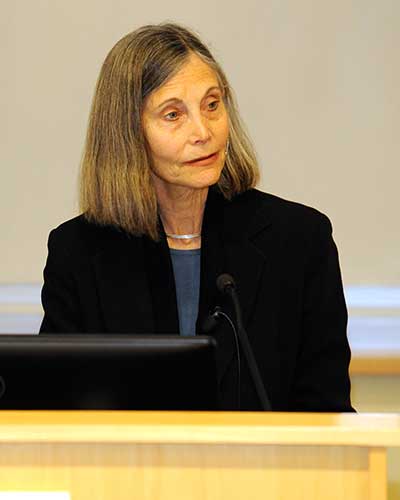May 02, 2016

Lecture Highlights the Importance of Establishing a Better Understanding of Health Disparities
In a lecture on April 19 in Taylor Lecture Hall at the University of Maryland School of Medicine (UM SOM), Dr. Paula Braveman, MD, MPH, Professor of Family and Community Medicine and Director of the Center on Social Disparities in Health at the University of California, San Francisco, argued that researchers and practitioners should view health disparities through the lens of social justice.
In her talk, she analyzed several definitions and offered a way to understand these issues that she argued could help researchers and practitioners move the field forward. Her talk was the third annual Renee Royak-Schaler Lecture in Health Disparities at UM SOM, an annual series sponsored by the UM SOM Department of Epidemiology and Public Health.
Dr. Braveman noted that sharp neighborhood and regional variations in rates of diseases, well-being and mortality can be viewed in different ways. She focused on the fact that health disparities generally refers to differences that are unfair in some way, and pointed out that not all health differences are health disparities: the fact that skiers tend to have more broken legs than non-skiers does not constitute a key health disparity.
She noted that when talking about health disparities we focus on criteria that are measurable. There is no accountability without measurement, she said. In addition, the definition should focus on criteria that are simple, intuitive and resonate with widely held beliefs. Dr. Braveman argued that human rights principles provide a key set of guideposts for understanding health disparities. The basic idea: all humans have the right to good health, and disparities can impede that.
Dr. Braveman is an expert in this area. For more than 25 years, she has studied and published extensively on health equity and the social determinants of health, and has worked to bring attention to these issues in the U.S. and internationally. Her research has focused on measuring, documenting, understanding, and addressing socioeconomic and racial/ethnic disparities, particularly in maternal and infant health. During the 1990s she collaborated with World Health Organization staff in Geneva to develop a global initiative on equity in health and health care. She has been the research director for a national commission on the social determinants of health in the U.S. supported by the Robert Wood Johnson Foundation. Throughout her career, she has collaborated with local, state, federal, and international health agencies to see rigorous research translated into practice with the goal of achieving greater equity in health.
“This lecture illustrates the importance of clarifying definitions when we try to understand health disparities and how we can reduce them,” said Jay Magaziner, PhD, MSHyg., Professor and Chair, Department of Epidemiology and Public Health. “Dr. Braveman illuminated the perspectives and controversies involved in this area, and provided a way forward through some of them.”
The lecture was underwritten with a generous donation from Magda Schaler-Haynes, JD, MPH, and Michael Haynes, daughter and son-in-law
of the late Dr. Renee Royak-Schaler.

Contact
Office of Public Affairs
655 West Baltimore Street
Bressler Research Building 14-002
Baltimore, Maryland 21201-1559
Contact Media Relations
(410) 706-5260
